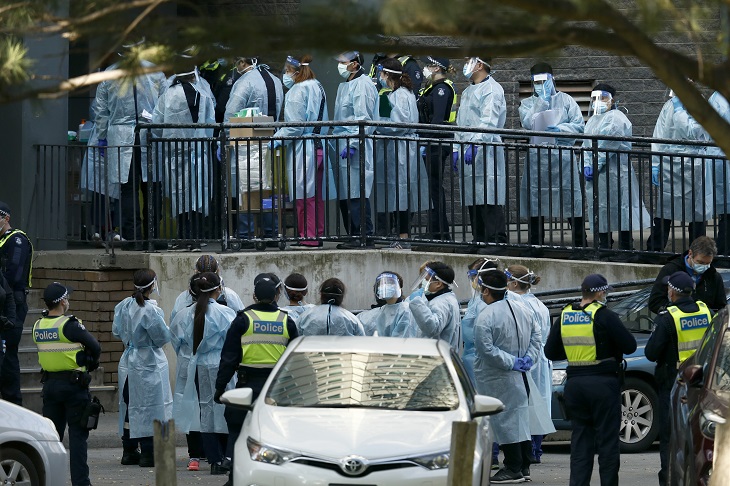I am in my fourth and final year of post-graduate medical school. From the beginning of second year in 2020, access to the academic and clinical learning environments for medical students has been at the behest of public health orders due to Covid.
From March of 2020, there has not been a week where predicted schedules have been able to be fulfilled.
The graduating cohort of junior doctors who have done most or all their university medical training during this pandemic have an Everest-level learning curve ahead when entering the workforce.
During the significant case spikes across this country, particularly in New South Wales and Victoria, student doctors, nurses, and allied health professionals are among the first to be banned from entering hospitals. These are individuals who will eventually be managing patients and, overnight upon graduation, deemed ‘essential workers’, yet they have been excluded from some of the most formative clinical learning they will undertake.
I study at The University of Queensland and have done most of my ‘placements’ in the state.
Here is little context of how medical school works to shed some light on why it was such a mistake to prevent willing and clinically able students from continuing training in-person during this crisis.
Most medical degrees are now four-year postgraduate programs. The first two years of the program are ‘pre-clinical’ and essentially involve lecture, workshop, and tutorial-based activities with minimal ‘clinical time’ in hospitals seeing patients. This is to lay the foundation of the basic clinical sciences that cover the physiology, anatomy, and pathology of the human body for application in real patients.
The third and fourth years of medical school are the ‘clinical years’ which are spent on ‘placements’ or ‘rotations’ in the hospital and community health settings. These expose students to general practice, psychiatry, and many hospital specialties that keep the health system operating. It is these years where rigorous clinical exposure and integration in the medial teams who manage patients is so vital.
Once you graduate, you are a ‘doctor’ and will have the power and responsibility to begin making decisions that will change people’s lives, sometimes with a simple note on the medication chart or clinical judgment on a night-shift.
Why are medical students reactively withdrawn from the clinical environment that they will very soon have to work in the second Covid-cases begin to rise?
Why not recruit our help and teach us how to work in a crisis?
Many of the public health measures that have been taken have placed Australia in a position where vaccination rollouts have soared ahead, the economy is calling people back to work and we are managing as a health system. Many measures have also been taken in complete short-sightedness and have profoundly disadvantaged large groups of people who society will desperately need one day in the future.
Undertaking my studies in Queensland has meant that I have spent large stretches of this pandemic in ‘zero-Covid’ circumstances. I decided to double down on this privilege and safeguard my clinical time by completing my third year (2021) of medical school in Rural Queensland.
We were incredibly protected from Covid shut-downs and had all the clinical time a student could want. My colleagues down in Brisbane, Sydney, and Melbourne have all reported enormous chunks of clinical time in hospitals, operating theatres, wards, and GP clinics as missing from their training. Their learning curve will be incredibly confronting when they are thrown into the wards of busy hospitals and are required to make decisions on behalf of very sick people.
Medical students should never have been removed from hospitals. We could have helped in the chaos of soaring case numbers and a pressured health system. We still can.
Medicine cannot be taught online. As the great Sir William Osler, often quoted as ‘The Father of Modern Medicine’ once said: ‘Medicine is learned by the bedside and not in the classroom.’
It is easy to criticise the decisions that were made when one has the benefit of looking down the retrospectoscope. It is very clear that many of our myopic decisions that ‘temporised’ the present situation, often ineffectively, will have long-lasting consequences.
When it comes to investing in and training the future workers of society, there is no substitute for experience. This is not unique to medicine. Children have been ripped out of classrooms and forced to ‘learn’ online, without in-person interaction with their peers for months on end.
What will this do to their socio-cognitive development?
Incoming university students across all disciplines have been relegated to the mysterious and impersonal ether of the ‘online classroom’. Many of them don’t even know what their campus looks like let alone developed new friendships, connections, and a sense of identity.
We want to be part of the solution, not excluded from it. You will need us to be as skilled, curious, and compassionate as possible as we walk into this brave new post-Covid world. Certainly from your future doctors and from the rest of society too.
Got something to add? Join the discussion and comment below.
Get 10 issues for just $10
Subscribe to The Spectator Australia today for the next 10 magazine issues, plus full online access, for just $10.

























Comments
Don't miss out
Join the conversation with other Spectator Australia readers. Subscribe to leave a comment.
SUBSCRIBEAlready a subscriber? Log in